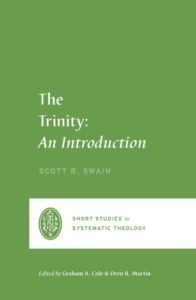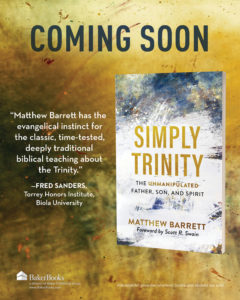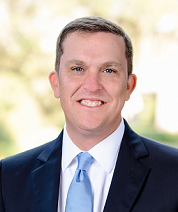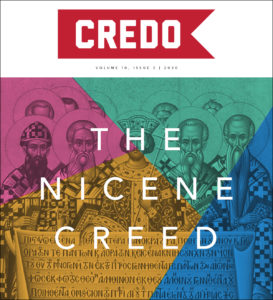Today, too many Christians are unfamiliar with how the Trinity is manifested to the church in the scriptures. Nor have they learned the biblical and historical language for the Trinity, finding phrases like “eternal relations of origin” or “inseparable operations” strange. As a result, we risk misunderstanding the triune God, a risk that has serious consequences.
In this interview, we talk to Scott R. Swain about his forthcoming book with Crossway, The Trinity: An Introduction (2020). Swain is President and James Woodrow Hassell Professor of Systematic Theology at Reformed Theological Seminary in Orlando, Florida. Swain is a leading systematic theologians today. Many Credo readers will know his books, including his work on reformed dogmatics, and his work on theological retrieval (a co-labor with R. Michael Allen). 
You begin your book on the Trinity in a very doxological manner. Why do you think it’s important that works of theology still maintain a doxological approach?
At the end of the day, doxology is the only appropriate response to the reality of God. The triune God is not only the supreme being: the sovereign source and end of all creatures (Rom. 11:36). He is also the supreme good, worthy of our highest trust, love, and praise (Ps. 106:48; 1 Tim. 1:17). Insofar as we fail to perceive the intrinsic connection between the truth about God and the goodness of God, we fail to perceive and judge God rightly. This is to take nothing away from the need for detailed exegesis and analytic rigor in theology. But theology is nothing if it is not a matter of tasting and seeing the goodness and greatness of God.
You focus not just on a particular tradition of ideas, but you emphasize a particular way of reading the Bible. How important is hermeneutics in developing Trinitarian thought?
The doctrine of the Trinity is the deliverance of special revelation not general revelation. Because our access to special revelation comes in Holy Scripture, our understanding of special revelation is always hermeneutical in nature, i.e., a matter of acquiring textual understanding.
When one studies the development of the church’s official teaching on the Trinity as expressed in its creeds it becomes immediately apparent that the church’s reading and exegesis of the Bible preceded the church’s doctrinal formulations. Scripture says, “You are my Son; today I have begotten you” (Ps. 2:7). Therefore, the church confesses that Jesus is “begotten, not made.” Consequently, if we wish to retrieve what the church historically has confessed regarding the Trinity in our day (which is the major aim of my book), we must retrieve its approach to reading Holy Scripture as well.
You offer a primarily biblical defense of the classical, Nicene doctrine of the Trinity. This method seems to imply that the Nicene conception of the Trinity is not a Greek-philosophical imposition on the Church. Why is that?
The Oxford patristics scholar Mark Edwards observes that a three-personed God would be the last thing Greek philosophy would have wanted to invent to solve its intellectual, moral, and spiritual questions. The church was not motivated by the questions and concerns of Greek philosophy in articulating its teaching on the Trinity. The church’s teaching on the Trinity emerged from its exegesis of Holy Scripture and its practice of baptizing in the triune name (Matt 28:19). When ecclesiastical pastors and teachers did draw on Greek philosophy, as they sometimes did, they reconfigured many of its fundamental principles to make them suitable for expressing Christian doctrine. The doctrine of the Trinity is strange teaching to Greek philosophy. But to those who embrace the self-attesting Christ of Scripture, the doctrine of the Trinity is the wisdom of God.
You spend an entire chapter on divine simplicity. To many contemporary Christians, this is counterintuitive; they see the doctrine of simplicity as a challenge to the doctrine of the Trinity, and vice versa. Why do you argue just the opposite?
The major opponents of divine simplicity in the history of theology have been anti-trinitarian theologians. This is for an obvious reason. Divine simplicity is essential to an orthodox trinitarian confession since it affirms that each person is identical with the one God (not just part of God). Without divine simplicity we are left with either tritheism or polytheism. The major opponents of divine simplicity in the history of theology have been anti-trinitarian theologians... Without divine simplicity we are left with either tritheism or polytheism. Click To Tweet
While we’re on the subject of simplicity, should simplicity naturally lead us to affirm that ancient belief that the external works of the Trinity are undivided?
Yes. Because God is one, God’s wisdom, love, and power are one. Therefore, the distinctions between the persons of the Trinity in their external works are not distinctions of agency. They are distinctions in mode of agency. The Father acts through the Son by the Spirit. The Son acts from the Father through the Spirit. The Spirit acts from the Father and the Son. But in each instance we are talking about one singular divine agency because we are talking about three persons who are one undivided God.
The Father is unbegotten, the Son is begotten from the Father, and the Spirit is spirated from the Father and the Son. Unfortunately, these eternal relations of origin are foreign to so many evangelicals today. But you argue that these alone distinguish the persons of the Trinity. Not only that, but they are ingrained within the biblical metaphors themselves. How so?
Christian teaching on the persons of the Trinity’s “eternal relations of origin” follows from biblical revelation of their personal names: “Father,” “Son,” and “Holy Spirit.” These names indicate the relations in which the persons stand to each other. The Father is “father” to the Son. The Son is “begotten” of the Father. The Spirit is “breathed” forth by the Father and the Son. Scripture uses other metaphors as well to further illumine these eternal relations of origin, describing, for example, the Son as the Father’s eternal “Wisdom” (Proverbs 8). 
When evangelicals hear the names “Father” and “Son” they sometimes assume that the immanent Trinity is defined by roles of authority and submission. As if what makes the Son a Son is that he is subordinate to the Father even apart from the economy of salvation. But you argue that such a view compromises the simplicity of the Trinity, as well as inseparable operations. Why?
Put simply: such a view compromises God’s singular kingship and authority. The only thing that distinguishes the persons of the Trinity from each other is their eternal relations of origin. In all other things, including divine kingship and authority, the persons are one. This is one of the central points of the New Testament’s most often-cited Old Testament passage, Psalm 110, which describes the Second Person of the Trinity as sharing the First Person’s heavenly throne. That the three persons of the Trinity share one divine throne is a sign that they share one unique and undivided authority. For this reason also, they are worthy of our undivided faith and worship.
Also, ESS (eternal subordination of the Son) or EFS (eternal functional subordination) compromise divine simplicity by taking a common property (i.e., divine authority) and turning it into a distinguishing property. The problem with this is that affirming distinct forms of authority in the Father, the Son, and the Spirit divides God’s authority.
Furthermore, ESS/EFS compromise the doctrine of God’s unity with respect to his agency (i.e., inseparable operations) by introducing three distinct wills into the Trinity and, in some cases, what sounds a lot like three different agencies. Concepts like eternal generation are certainly daunting. But we shouldn’t expect anything less. We’re talking about the triune God after all! Click To Tweet
The Holy Spirit, as the cliché goes, is often said to be the forgotten member of the Trinity. Why do you think that is, and how can a right view of the Trinity serve to honor the Spirit of the Father and Son?
One reason for the Spirit’s relative neglect is traceable to the development of doctrine. The Arian crisis was a debate about the Second Person of the Trinity. The Third Person was less a matter of focus during that debate. Another reason, however, is attributable to the Third Person’s specific mode of operation in the history of redemption, which is to glorify the Son. The way to honor the Holy Spirit is not just to talk about him more, or even necessarily to adopt the piety and practices of those who spend a lot of time talking about him. The best way to honor the Spirit is to study his person and work as revealed in Holy Scripture and to enter into fellowship with him through the means he has appointed for doing so: the ministry of Word and Sacrament, prayer, and other divinely ordained acts of public and private worship by which the Holy Spirit directs us to the glory of Jesus Christ.
When pastors think about teaching on the Trinity, terms like “eternal generation” or “inseparable operations” or “perichoresis” can feel daunting. Why should pastors risk losing their congregants on these heady terms?
These are biblical terms or else conceptual paraphrases of biblical terms and teaching. Therefore, if we are leading God’s people to hear, pray, and sing the Bible, pastors cannot get away from teaching our congregations about such concepts. These concepts are certainly daunting. But we shouldn’t expect anything less. We’re talking about the triune God after all!
Nor should we want anything less. Our faith is enriched by gaining a deeper understanding of God as he reveals himself to us in Holy Scripture. These truths enlarge our minds and expand our affections. As we gain greater fluency in these terms and concepts, they also provide further opportunities to open our lips in praise of the name into which we are baptized: the name of the Father and of the Son and of the Holy Spirit.


